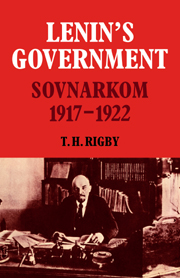Book contents
- Frontmatter
- Contents
- Tables
- Preface
- Acknowledgements
- Abbreviations
- Part One SMOLNY: SOVNARKOM TAKES SHAPE
- 1 The origins of Sovnarkom
- 2 ‘The first proletarian government’
- 3 Sovnarkom takes over
- 4 Acquiring a bureaucracy
- Part Two THE KREMLIN: SOVNARKOM IN ACTION
- Part Three OF MEN AND INSTITUTIONS
- Appendix A
- Appendix B
- Notes
- Bibliography
- Index
- Plate section
3 - Sovnarkom takes over
Published online by Cambridge University Press: 05 November 2011
- Frontmatter
- Contents
- Tables
- Preface
- Acknowledgements
- Abbreviations
- Part One SMOLNY: SOVNARKOM TAKES SHAPE
- 1 The origins of Sovnarkom
- 2 ‘The first proletarian government’
- 3 Sovnarkom takes over
- 4 Acquiring a bureaucracy
- Part Two THE KREMLIN: SOVNARKOM IN ACTION
- Part Three OF MEN AND INSTITUTIONS
- Appendix A
- Appendix B
- Notes
- Bibliography
- Index
- Plate section
Summary
What distinguished the Council of People's Commissars from the other supreme bodies established by the Bolshevik regime was that it had direct responsibility for the inherited central machinery of government, which it was supposed to drastically purge and refashion for the purposes of the revolution, and through this machinery for the field administrative units of the State. In order to exercise this role, however, it had to accomplish two things: to develop effective internal procedures for taking decisions and controlling their implementation, and to establish its authority over the various ministries and other government agencies and get them working for the ‘Workers' and Peasants' Government’. We shall be giving separate consideration to these two topics in this chapter and the next, but it must be borne in mind that the developments described occurred simultaneously and were mutually dependent. First of all, however, we must take note of the political circumstances amid which these developments took place.
The four months when the Council of People's Commissars and the other supreme organs of Soviet rule all continued to operate from the Smolny Institute in Petrograd were a period of continuous flux and uncertainty. There were early abortive attempts to overthrow the infant Soviet regime by force, and the possibility of more massive ‘counter-revolutionary’ blows was constantly present. It was long in doubt whether the writ of revolutionary Petrograd could be made to run effectively in the country at large, or whether the tragic experience of the Paris Commune would be repeated.
- Type
- Chapter
- Information
- Lenin's GovernmentSovnarkom 1917-1922, pp. 25 - 39Publisher: Cambridge University PressPrint publication year: 1979

